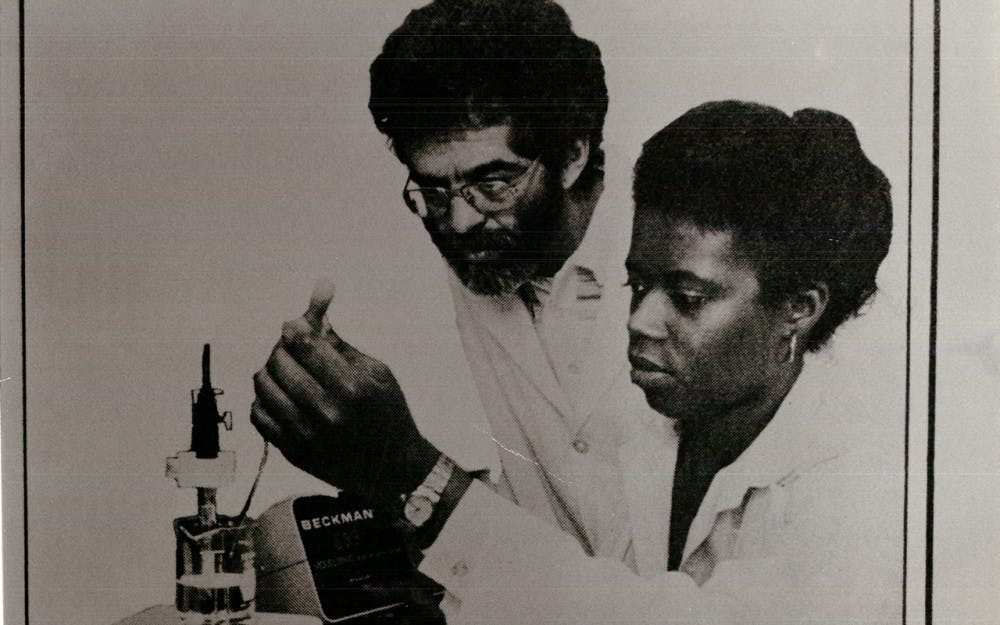When Dr. Janetta Kelly was a student at IU in the early 1970s, she was able to play on the volleyball team and serve as a resident assistant. But when it came to bid night in 1974 and an opportunity to join an all-white sorority, she opened a blank envelope.
Kelly has been a traveling pediatrician for 25 years, but she said she still remembers her time at IU vividly. She said she also remembers even earlier times, from her childhood, like attending a segregated school in Chattanooga, Tennessee.
“We were still segregated,” Kelly said. “I attended an all-black school all the way up to halfway through second grade. I was born in an all-black hospital. We moved to a predominantly white school because my parents thought integration was important.”
Segregation was not good enough for her family, so the Kellys uprooted and moved to Indianapolis. The integrated public schools of Indianapolis altered how Kelly viewed the world, she said. It formed her perspective that all people were equal and worthy of her time or respect.
She arrived at IU in fall 1973 and lived on an honors floor in Willkie Quad where she was one of three African-American women. She played volleyball for IU but said she had to give it up when she realized her academics were more important than athletics.
During her sophomore year she continued prioritizing academics by deciding to rush academically focused organizations.
“I thought predominantly white sororities focused more on academics and would be more supportive,” Kelly said. “I had fun rushing. I was the only black female wherever I went.”
However, Kelly said that did not deter her because she had gone to high school with girls in almost every sorority. She also spent enough time in integrated schools to feel comfortable when she stood out.
“I would be the only black girl in the house,” Kelly said.
Her friends in the sororities were her advocates because Kelly said sororities were surprised to see her and not ready to integrate their homes.
Debates between those for and against integration continued all the way through rush.
“They found me interesting,” she said. “Most sororities had preset questions, but somehow we always ended up talking beyond their questions.”
She made it past the preliminary rounds of sorority recruitment and was invited back every time, including the final round. As the process went on she began to realize which houses were the best fit for her, and she had her top two choices.
“Kappa Alpha Theta and Chi Omega, right up to preference night, had me in the running,” she said.
She said she leaned toward Theta because she had a friend she had known since high school there.
The day had come. She and other girls went to collect their envelopes. She picked hers up and went back to her dorm room.
The envelope was empty.
“I was crushed,” Kelly said. “I was. To go through that whole process, revisiting the houses, thinking I am being accepted. To not get a bid at all was very devastating. It did hurt my feelings considerably.”
She said she cried in her bed and spoke only with her mother and one floor mate because the other women on her floor did not care about sorority recruitment.
Kelly was dumbfounded by how she had lasted that long and not received a bid. She said from all the stories she heard from her sorority friends, what had happened to her was unheard of. She would not realize the full scope of her situation until her friends filled her in.
“I know different friends that had come back to me after advocating for me to join were very upset,” she said. “They made it a point to let me know.”
That was the end of the greek experience for Kelly. She spent her last two years at IU as a residence assistant in Briscoe Quad, where the extent of her involvement with greek life was advising the young sorority hopefuls on her floor.
“I chose not to apply after that experience,” she said. “If I saw my friends in sororities on campus I would stop and interact with them.”
Then they went on their separate ways and only saw each other in passing. Kelly said her life is not defined by this one incident. She would go on to graduate from IU and attend medical school.
However, she said the memory has stayed with her and she has some hope for the current and future IU.
“As many years as I’ve been gone I would hope that there’s a black female in every sorority house on campus,” she said.






